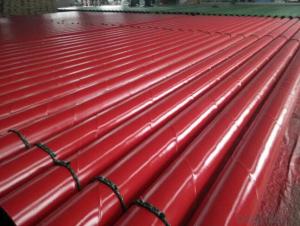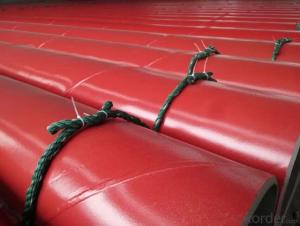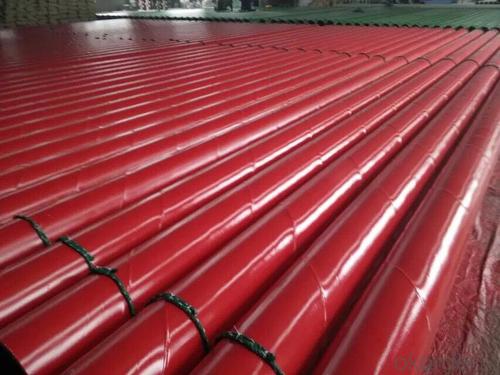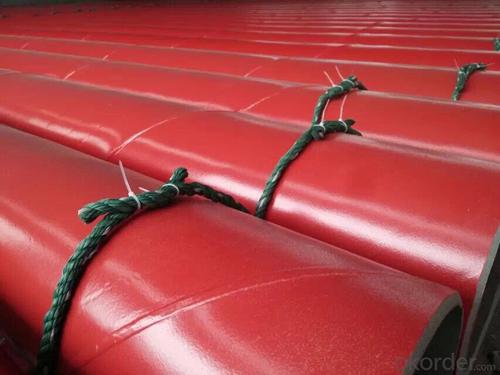welded steel pipe external coating
- Loading Port:
- China Main Port
- Payment Terms:
- TT OR LC
- Min Order Qty:
- -
- Supply Capability:
- -
OKorder Service Pledge
OKorder Financial Service
You Might Also Like
Specifications
water pipeline inner-layer tape
1 Butyl rubber as adhesive
2. SGS test report and DVGW certificate
3. corrosion protection
water pipeline inner-layer tape
State-of-the-Art Pipeline Protection for All Climates & Environments
System description:
WATER PIPELINE Inner -layer tape also be called pipe wrap anti-corrosion tape, polyethylene wrap tape.
water pipeline Inner-layer tapeT100 is engineered to assure a high bond to the primed pipe surface with excellent conformability characteristics, aggressive adhesive for corrosion protection and repair of main line coatings.
Inner-layer tapeT100 series is cold applied tape coating system for corrosion protection of Oil, Gas, Petrochemical, and Waste Waterburied pipeline, pipe can be buried, also can be underground ,overhead ,onshore and offshore .
Structure of water pipeline inner wrap tape
The specification of the tape consists of two layers, adhesive layer and film backing
Adhesive: butyl rubber
Film backing: Special blend of stabilized polyethylene
Features & Benefits
Provides a permanent bond to the primed steel pipes surface and provides protection against chemical electrolytic corrosion for underground pipelines.
long term corrosion protection
Worldwide reference lists. Established in-ground history
High chemical resistance under service temperature.
Outstanding electric property and permanent adhesion.
Cold applied, No release liner. Makes installation fast and easy.
Complies with EN-DIN 30672 and AWWAC-214 international standards and also ASTM standards.
Be used for water pipeline corrosion protection
System Properties
Type | T138 | T 150 | T165 | T180 | T 250 | T265 | T280 | |
Thickness | 15mil 0.38mm | 20mil 0.508mm | 25mil 0.635mm | 30mil 0.762mm | 20mil 0.508mm | 25mil 0.635mm | 30mil 0.762mm | |
Backing | 9mil 0.229mm | 9mil 0.241mm | 10mil 0.25mm | 10mil 0.25mm | 15mil 0.38mm | 20mil 0.508mm | 25mil 0635mm | |
Adhesive | 6mil 0.152mm | 11mil 0.279mm | 15mil 0.381mm | 20mil 0.508mm | 5mil 0.127mm | 5mil 0.127mm | 5mil 0.127mm | |
When used for ductile iron pipes inner layer 980-20 or 980-25 and outer layer 955-20 or 955-25 are recommended. | ||||||||
Elongation | ³300% | ³400% | ||||||
Tensile Strength | 55 N/cm | 70 N/cm | ||||||
Color | Black | White | ||||||
Peel Adhesion to Primed Pipe | 33 N/cm | |||||||
Dielectric Strength | 30 KV | |||||||
Dielectric Breakdown | 26 KV/mm | |||||||
Cathodic Disbandment | 0.24 in radius 6.4 mm | |||||||
Water Vapor Transmission Rate | < 0.1% | |||||||
Volume Resistivity | 2.5 x 1015 ohm.cm | |||||||
Impact resistance | 5.5Nm | |||||||
Penetration Resistance | <15% | |||||||
Performance | AWWA C-209,ASTM D 1000,EN 12068 | |||||||
Order information
Length | 100ft(30 M),200ft(60 M),400ft(120 M),800ft(240 M) |
Width | 2’’(50mm),4’’(100mm),6’’(150mm),17’(450mm),32’’(800mm) |
- Q: How are steel pipes used in the construction of dams and water reservoirs?
- Steel pipes find widespread application in the construction of dams and water reservoirs owing to their remarkable durability, strength, and capacity to endure heavy loads and high pressure. These pipes serve multiple indispensable functions within the realm of dam and reservoir construction. A primary utility of steel pipes in these structures lies in their capacity to transport water. They are employed to convey water from its source, such as a river or stream, to the reservoir or dam. These pipes are engineered to withstand the elevated water pressure, ensuring a consistent flow of water to the reservoir. The durability of steel pipes enables them to remain intact even in the harshest environmental conditions. In addition to water conveyance, steel pipes are also utilized for drainage purposes. They are employed to establish drainage systems that help regulate the water level within the reservoir or dam. These pipes are strategically positioned to control the water flow and prevent potential flooding or overflow. Steel pipes are also integrated into the construction of spillways and outlets in dams and reservoirs. Spillways are designed to release excess water from the reservoir during heavy rainfall or when the water level exceeds predetermined thresholds. Steel pipes are employed in crafting these spillways to provide a controlled pathway for water discharge, thus averting any harm to the dam or surrounding areas. Moreover, steel pipes are employed in the construction of penstocks, which are large conduits that transport water from the reservoir to turbines in hydropower plants. The pressure generated by the water within these pipes propels the turbines, facilitating electricity generation. The robustness and durability of steel pipes are vital in ensuring the smooth and efficient operation of hydropower plants. All in all, steel pipes occupy an indispensable role in the construction of dams and water reservoirs. Their durability, strength, and ability to withstand high pressure render them an ideal choice for various aspects of these structures, including water transportation, drainage systems, spillways, and penstocks.
- Q: How do you calculate the pipe deflection for steel pipes?
- To determine the pipe deflection of steel pipes, various factors must be taken into account. Pipe deflection refers to the bending or displacement that occurs when a load is applied. The following steps outline the process for calculating pipe deflection: 1. Obtain the steel pipe properties: Familiarize yourself with the material properties of the steel pipe, including its Young's modulus (E) and moment of inertia (I). Young's modulus denotes the material's stiffness, while the moment of inertia measures its resistance to bending. 2. Identify the applied load: Determine the nature and magnitude of the load that will be exerted on the pipe. This may encompass internal pressure, external loads, or thermal expansion. 3. Utilize the appropriate formula: Depending on the load type and pipe support conditions, the suitable formula must be employed to calculate the deflection. For instance, if the pipe is simply supported (fixed at both ends), the formula δ = (5 * w * L^4) / (384 * E * I) can be used. Here, δ represents the deflection, w signifies the load per unit length, L denotes the pipe length, and E and I refer to the previously mentioned material properties. 4. Input values and compute: Insert the load, pipe length, and material properties into the formula. By doing so, the deflection of the steel pipe can be determined. It is crucial to note that calculating pipe deflection is a complex procedure that necessitates expertise in structural engineering. Therefore, it is advisable to consult a professional engineer or employ specialized software for accurate and reliable results.
- Q: What is the single length of galvanized steel pipe?
- Galvanized steel pipe is divided into cold galvanized steel pipe, hot galvanized steel pipe, cold galvanized steel pipe has been banned, and the latter is also advocated by the state for the moment, can be used. In 60s and 70s, developed countries began to develop new types of pipes, and galvanized pipes were banned.
- Q: Can steel pipes be used for hydronic heating systems?
- Yes, steel pipes can be used for hydronic heating systems. Steel pipes are commonly used in hydronic heating systems due to their durability, strength, and ability to withstand high temperatures and pressures. They are also resistant to corrosion, making them suitable for long-term use in these systems.
- Q: What are the different coatings applied to steel pipes?
- There are several different coatings that can be applied to steel pipes to enhance their corrosion resistance and durability. Some common coatings include epoxy coatings, polyethylene coatings, zinc coatings (galvanization), and polyurethane coatings. Each coating has its own specific benefits and is chosen based on the intended application and environmental conditions.
- Q: What are the limitations of using steel pipes?
- Using steel pipes in various applications has several limitations. Firstly, the cost of steel pipes compared to materials like plastic or copper can be quite high. This can be a significant drawback for projects with limited budgets. Secondly, steel pipes are susceptible to corrosion. Exposure to moisture and certain chemicals over time can cause rust and deterioration. This can lead to leaks, reduced structural integrity, and the need for expensive repairs or replacement. Another limitation is the weight and rigidity of steel pipes. They are generally heavier and less flexible than other types of pipes, making installation and maneuvering more challenging in certain settings. Additionally, their rigid nature makes them less suitable for applications requiring movement or flexibility. Furthermore, steel pipes can experience thermal expansion and contraction. Extreme temperatures can cause them to expand or contract, potentially stressing joints, fittings, or other components. This can lead to leaks or even pipe failure if not properly addressed. Lastly, steel pipes are not as resistant to certain chemicals or substances as other materials. Some chemicals can corrode or erode the inner lining, compromising integrity and potentially causing contamination or leakage. While steel pipes have advantages, it is important to consider these limitations when selecting the most suitable material for a specific application.
- Q: What is the buckling type thin-wall steel pipe? What is a tight set of thin-walled steel tubes? What's the difference between the two?
- The thread of the tightening (JDG) joint is unified with an outer thread, a wall thickness of 1.5mm, and a button (KBG). The thread of the joint is an internal thread, and the wall thickness is 1.0mm. Withholding type joint for the use of the same company and pipe connection to matching products with complete connection clamp buckle. Fastening and pressing type correctly connected and locked after no need to do a cross ground.
- Q: Can steel pipes be used for underground drainage in acidic soils?
- When considering underground drainage in acidic soils, it is important to take certain factors into account. The use of steel pipes can be suitable for this purpose, but there is a risk of corrosion over time which may weaken the pipes and potentially lead to failure. To minimize this risk, it is recommended to opt for galvanized steel pipes that have been treated with a protective coating to resist corrosion. Regular inspection and maintenance are also essential to promptly address any signs of corrosion or deterioration. Moreover, it is worth exploring alternative materials like PVC or HDPE pipes, which have greater resistance to corrosion in acidic environments. Ultimately, the choice of material should be based on a comprehensive evaluation of the soil conditions, expected lifespan of the drainage system, and budgetary constraints.
- Q: How are steel pipes used in the manufacturing of fire sprinkler systems?
- Steel pipes are commonly used in the manufacturing of fire sprinkler systems due to their durability and resistance to high temperatures. These pipes are used to transport water or other fire suppressants from the water supply to the sprinkler heads. The steel pipes are able to withstand the pressure and heat generated during a fire, ensuring a reliable and effective fire suppression system.
- Q: How do you prevent steel pipes from freezing in cold climates?
- One way to prevent steel pipes from freezing in cold climates is by insulating them with materials such as foam insulation or heat tape. This helps to maintain the temperature of the pipes and prevents them from freezing. Additionally, ensuring that all cracks or openings in the walls or foundation where the pipes are located are sealed can also help in preventing the pipes from freezing.
Send your message to us
welded steel pipe external coating
- Loading Port:
- China Main Port
- Payment Terms:
- TT OR LC
- Min Order Qty:
- -
- Supply Capability:
- -
OKorder Service Pledge
OKorder Financial Service
Similar products
Hot products
Hot Searches
Related keywords




















